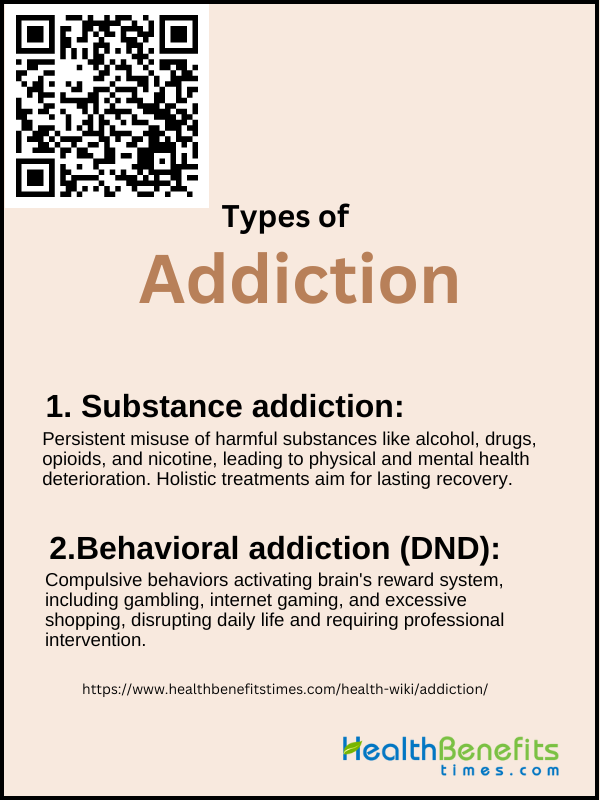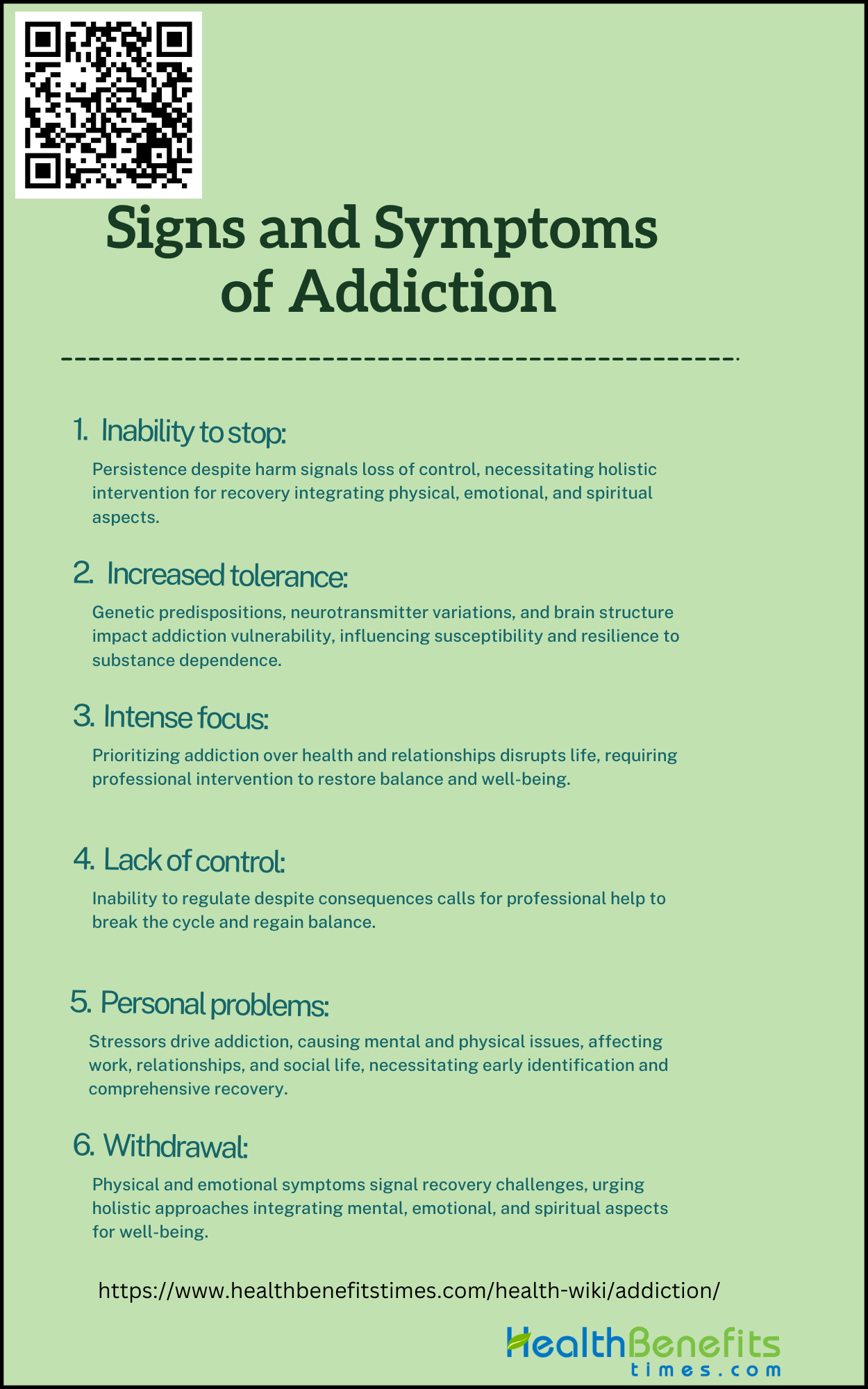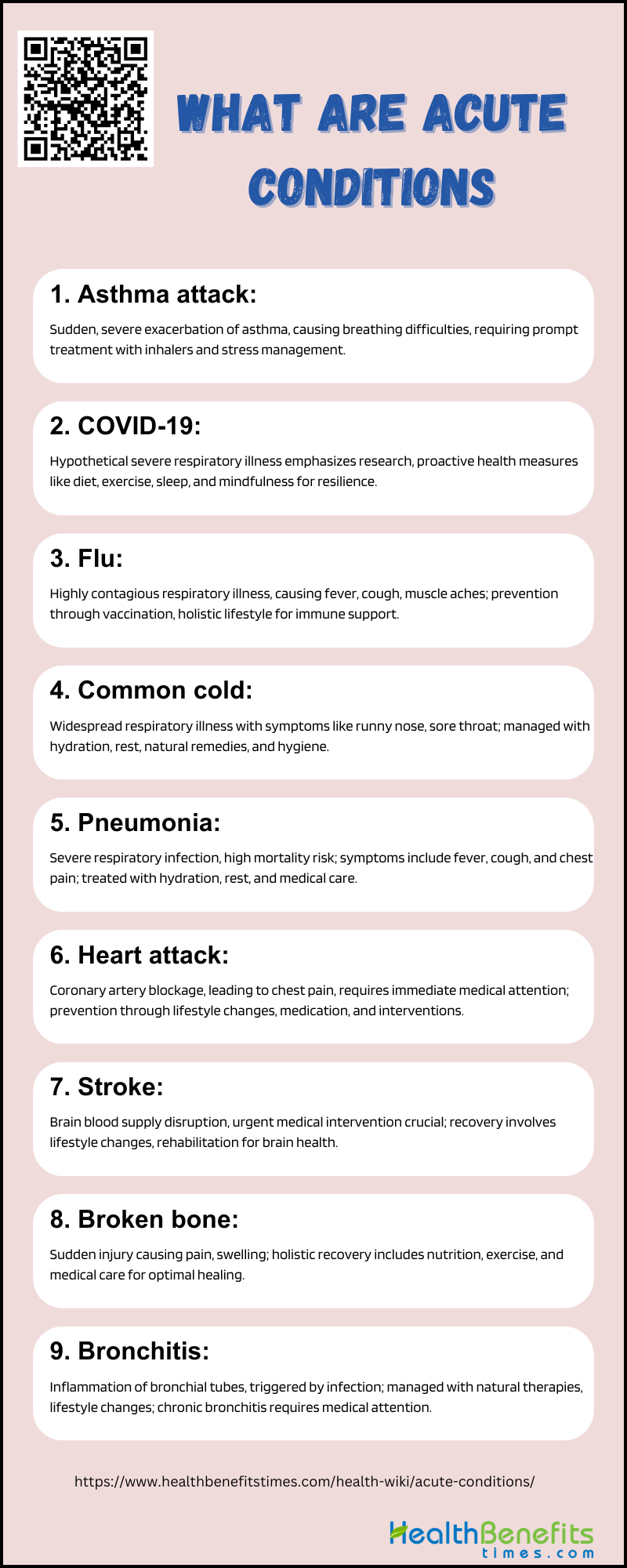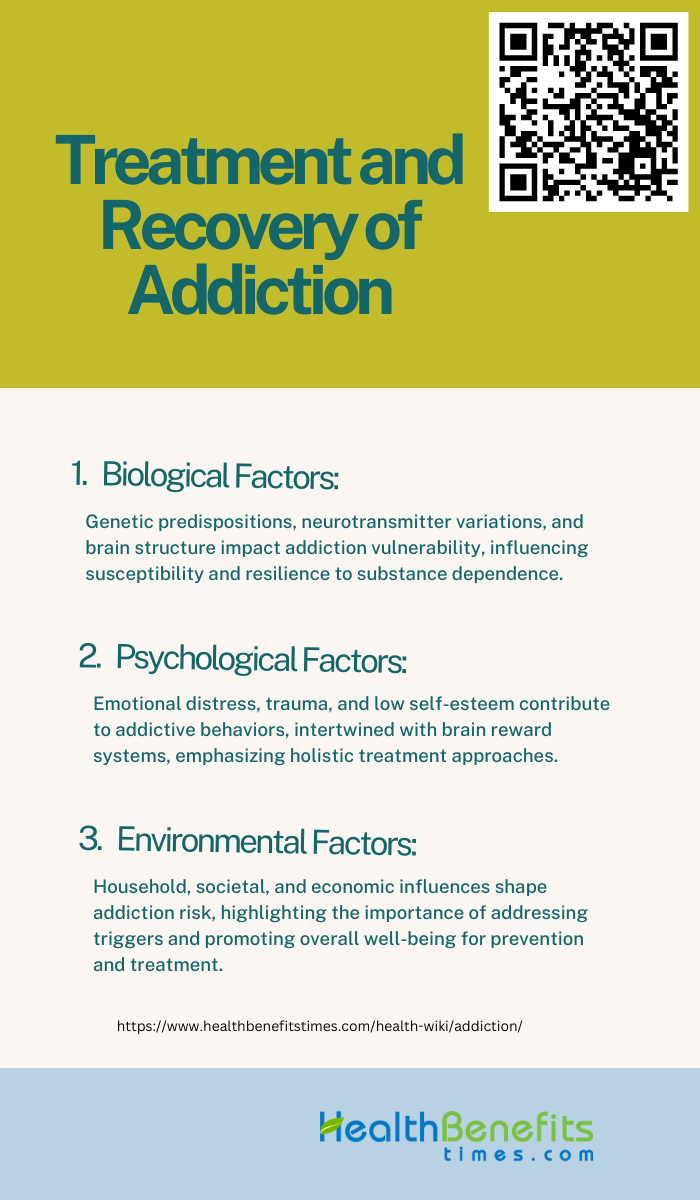Addiction is a chronic relapsing disorder characterized by compulsive substance use, such as alcohol, cannabis, and opioids, as well as behaviors like gambling, eating, and excessive shopping. This condition is not simply a lack of self-control, but rather a result of significant changes in brain circuitry, particularly affecting neurotransmitters like dopamine that drive the addictive cycle. It is important to recognize that addiction is deeply rooted in an individual’s mental, emotional, physical, and spiritual well-being. Taking a holistic approach to addressing addiction is crucial, as it requires a comprehensive strategy that considers all aspects of an individual’s life, promoting recovery and healing through practices that support overall health.
Types of Addiction
Addiction is a complex and multifaceted condition that presents in various forms, affecting both physical and mental health. It is essential to comprehend the different types of addiction in order to identify signs and access suitable treatment. In this article, we examine the main categories of addiction, offering insights into each to promote awareness and aid in recovery.
1. Substance addiction
Substance addiction is a prevalent neuropsychiatric disorder characterized by a persistent urge to misuse harmful substances, such as alcohol, nicotine, opioids, and illicit drugs, despite the detrimental effects on health, relationships, and overall well-being. Alcohol dependence, cannabis use disorder, and opioid use disorder are the most common forms of addiction, presenting significant challenges to overall health and often leading to a destructive cycle of intense cravings, withdrawal symptoms, and a continuous pursuit of the substance. Holistic health strategies for addressing substance addiction involve a comprehensive treatment plan that integrates physical, emotional, and spiritual recovery approaches. These approaches, including nutritional support, regular exercise, mindfulness meditation, and community therapy, aim to restore balance and promote lasting recovery, empowering individuals to regain control over their health and achieve a state of well-being.
- Alcohol
- Caffeine
- Cannabis (marijuana)
- Hallucinogens, such as PCP and LSD
- Anti-anxiety drugs such as sleeping pills, benzodiazepines and barbiturates
- Inhalants like paint thinners, aerosol sprays, gases and nitrites (poppers)
- Prescription and non-prescription opioids like codeine, oxycodone and heroin
- Prescription and non-prescription stimulants like Adderall, cocaine and methamphetamine
- Tobacco/nicotine like smoking cigarettes and electronic cigarettes (e-cigarettes or vaping)
2. Non-substance or Behavioral addiction (DND)
Behavioral addictions, also known as non-substance addictions or DND, are characterized by compulsive behaviors that activate the brain’s reward system without the use of psychoactive substances. Examples of these behaviors include gambling, internet gaming, social media use, shopping, and excessive exercise. When these activities shift from being enjoyable to necessary, they can cause significant distress and interfere with daily functioning. These addictions are recognized as serious health concerns due to their profound psychological, social, and physical impacts. The inclusion of gambling disorder in the DSM-5 reflects the growing awareness of these issues. It is crucial to approach these behaviors with a comprehensive understanding, recognizing their potential to disrupt lives and the importance of seeking professional help and maintaining a balanced lifestyle.
- Gambling
- Eating
- Exercising or dieting
- Shopping
- Shoplifting or other risky behaviors
- Having sex
- Viewing pornography
- Video gaming (internet gaming disorder)
- Using internet (on your phone or a computer)

Causes of Addiction
Addiction is a complex disease influenced by a variety of factors that interact to make individuals vulnerable to substance use disorders. These factors include genetic predispositions, environmental influences, psychological conditions, and social interactions. Understanding these causes is essential for developing effective prevention and treatment strategies.
1. Biological factors
Biological factors a significant role in influencing the risk of addiction, with hereditary factors accounting for up to 60% of vulnerability to substance dependence. Variations in genes that impact neurotransmitters such as dopamine and serotonin, as well as enzymes involved in metabolizing substances like alcohol, can either increase susceptibility or provide resilience against addiction. These biological foundations, including individual variations in brain structure and function, are crucial for understanding the compulsive behaviors linked to addiction. Recognizing these factors is essential for developing comprehensive health strategies that address physical, mental, and emotional aspects in a well-rounded approach to recovery.
- Genetics
- Physiological factors
- Gender
2. Psychological Factors
Psychological factors play a significant role in the development of addiction, affecting an individual’s vulnerability to addictive behaviors. Emotional distress, low self-esteem, and a history of trauma, especially during early development, can contribute to substance abuse as a coping mechanism. The brain’s reward system also plays a role in reinforcing the pursuit of pleasure through addiction. Holistic health approaches that consider mental, emotional, and physical factors are crucial in effectively treating addiction, recognizing the intricate relationship between psychological influences that increase the likelihood of dependency.
- Personality factors
- Trauma and abuse
- Mental health factors
3. Environmental Factors
In the field of holistic health and wellness, it is important to recognize the interaction between environmental factors, genetics, and personal choices in the development of addiction. Factors such as a household environment where substance use is prevalent, societal pressures, and difficult life events can all contribute to the development of addictive behaviors. These influences, along with access to addictive substances and one’s social and economic stability, play a role in determining the risk of addiction. By understanding and addressing these environmental triggers, we can develop prevention and treatment strategies that promote overall well-being and help individuals lead healthier lives.
Signs and Symptoms of Addiction
Understanding the signs and symptoms of addiction is essential for early detection and effective intervention. Addiction can present through a range of physical, behavioral, and psychological indicators that interfere with an individual’s daily life and well-being. Recognizing these signs can aid in seeking timely assistance and support for those impacted.
1. Inability to stop
Struggling to overcome addictive behaviors is a clear indication of an underlying issue that can disrupt daily life and signify a lack of control. When an individual continues to use a substance or engage in a behavior despite the desire to quit and awareness of its harmful effects, it demonstrates the strong influence addiction has on the brain’s reward system. This intense urge often persists, displacing once enjoyable activities and resulting in negative effects on personal and professional well-being. Holistic health perspectives emphasize the importance of recognizing these warning signs and promoting a compassionate, comprehensive approach to recovery. This approach may involve professional assistance that integrates physical, emotional, and spiritual healing to assist individuals in navigating the complexities of overcoming addiction and restoring overall wellness.
2. Increased tolerance
Increased tolerance is a significant indicator of addiction, characterized by the need for larger amounts of a substance or more intense behaviors to achieve the same level of euphoria. This phenomenon can occur with substances such as opioids or activities like gambling. It serves as a warning that the body is developing a tolerance to the addictive substance or behavior, which can lead to increased usage and heightened risks. Seeking early intervention is crucial in addressing both the physical and emotional aspects of addiction, with the goal of achieving complete recovery.
3. Intense focus on the substance or activity
The hallmark of addiction is a strong focus on a substance or activity that takes priority over everything else, resulting in neglect of health, responsibilities, and relationships. This obsession with the addictive behavior disrupts daily life and well-being, causing individuals to prioritize their addiction over their interests and social connections. This cycle not only consumes time and resources but also indicates the necessity for professional intervention to regain a balanced and healthy lifestyle. Recognizing this pattern is crucial in addressing the addiction before it causes further harm.
4. Lack of control
A key indicator of addiction is the persistent inability to control substance use or behavior, despite experiencing negative consequences and a strong desire to stop. Individuals with addiction may try to establish limits but often fail to follow through, resulting in a harmful cycle of increased use and tolerance. This lack of self-regulation can disrupt daily life and well-being, highlighting the need for professional intervention to break the cycle and restore balance.
5. Personal problems and health issues
Addiction is closely linked with personal struggles and health issues, often compromising overall well-being. Factors such as stress, cultural expectations, and peer pressure can drive individuals towards substance abuse, resulting in mental health issues like anxiety and depression, as well as physical symptoms such as weakened immune system and fatigue. This can negatively affect relationships, work productivity, and social interactions. Early identification of these symptoms is crucial for comprehensive recovery, addressing the wide-ranging effects of addiction on health and daily life to enhance overall quality of life.
6. Withdrawal
Withdrawal symptoms indicate the body’s attempt to regain equilibrium following addiction, manifesting as physical and emotional difficulties such as anxiety, sleep disturbances, shaking, and nausea. It is essential to recognize these symptoms in a holistic health, fitness, and wellness context, as they underscore the importance of a comprehensive recovery strategy that addresses all aspects of an individual. Integrative therapies such as meditation, yoga, and acupuncture can assist in managing these symptoms and promoting a recovery process that respects the mental, emotional, and spiritual components of overall well-being.
Treatment and Recovery of Addiction
Embarking on the journey to overcome addiction is a transformative process that involves the integration of both the body and mind. In the following section, we outline several key strategies that support the treatment and recovery of addiction, promoting a balanced and healthy lifestyle.
1. Self-help programs
Self-help programs like Alcoholics Anonymous (AA) and Narcotics Anonymous (NA) play a crucial role in assisting individuals in their journey towards recovery from addiction. These peer-led groups provide a supportive environment where individuals can share experiences and offer mutual support, which are essential for promoting personal growth, resilience, and long-term sobriety. By integrating traditional treatment methods with holistic approaches that address physical, mental, and spiritual well-being, these programs advocate for a comprehensive recovery strategy that empowers individuals and aligns with their values, ultimately promoting a healthier and more balanced lifestyle.
2. Psychotherapy
Psychotherapy, an essential component of addiction treatment, utilizes a holistic approach to assist individuals in overcoming substance dependence by addressing its psychological origins. Techniques such as cognitive-behavioral therapy (CBT) and motivational interviewing play a crucial role in altering negative thought patterns and strengthening the motivation for change. Within a supportive and confidential environment, psychotherapy allows individuals to explore their emotions, understand the impact of addiction on their mental health, and develop effective coping mechanisms. This comprehensive approach not only helps in resolving underlying issues but also enhances mental well-being and establishes a foundation for a resilient, substance-free future.
3. Hospital management
The management of hospitals plays a crucial role in guiding individuals through addiction recovery. By offering a combination of medical and holistic therapies, such as detoxification, medication support, and activities like yoga and meditation, hospitals create a supportive environment for patients to begin their recovery process. This holistic approach not only addresses the immediate medical needs of patients but also promotes their overall well-being, leading to sustainable recovery. Hospital staff, particularly hospitalists, is instrumental in implementing this integrated strategy, ensuring that each patient receives personalized care tailored to their specific needs, ultimately setting the stage for long-term wellness and stability.
4. Medications
Medications play a crucial role in alleviating withdrawal symptoms and reducing cravings to facilitate recovery. Established treatments such as methadone, buprenorphine, naltrexone, acamprosate, and disulfiram complement counseling and behavioral therapies, creating a comprehensive approach. To promote long-term health and well-being, it is important to integrate these medical interventions with a holistic wellness plan that includes nutritional advice, exercise, mindfulness, and psychological support. This approach addresses the multifaceted nature of addiction and promotes sustained healing.
5. Rehabilitation (rehab)
Rehabilitation, also known as rehab, is crucial in assisting individuals in overcoming addiction and reclaiming their lives. It goes beyond simply abstaining from harmful substances or behaviors, focusing on a holistic approach that addresses the physical, emotional, and spiritual well-being of a person. By incorporating a variety of therapies such as counseling, cognitive-behavioral therapy, yoga, meditation, and nutritional guidance, rehab programs aim to equip individuals with the necessary skills and coping mechanisms for long-term sobriety. The ultimate objective is to promote a balanced lifestyle that supports ongoing recovery, ensuring that each individual is treated as a whole person, not just their addiction.
6. Talk Therapy
Talk therapy, an essential component of holistic health, offers a supportive environment for individuals struggling with addiction to explore and address the underlying reasons for their substance use. Through meaningful discussions with a qualified therapist, individuals acquire skills to regulate emotional distress and establish successful coping mechanisms. Utilizing techniques such as cognitive-behavioral therapy and motivational interviewing, talk therapy promotes self-awareness and emotional regulation, serving as a crucial factor in cessation of substance use and avoidance of relapse. By integrating with other forms of recovery interventions, it promotes a comprehensive approach to well-being necessary for long-term recovery.
7. Support group
Support groups are a cornerstone of addiction recovery, providing a supportive environment for individuals to share their experiences and grow alongside peers facing similar challenges. Groups like Alcoholics Anonymous and Narcotics Anonymous offer emotional support and practical advice, fostering a sense of community that promotes long-term sobriety. Recognizing the importance of a holistic approach to health, the inclusion of support groups in treatment plans is seen as a valuable tool in improving overall well-being by addressing emotional and social needs. Through mutual support and shared experiences, individuals are able to find the strength and motivation to maintain a substance-free lifestyle, underscoring the vital role that support groups play in the recovery process.
8. Counseling
Counseling plays a crucial role in assisting individuals in overcoming addiction by providing them with the necessary support to abstain from drugs or alcohol. Counselors collaborate with each individual to determine the most effective approach for their recovery, recognizing that each person is unique and requires a personalized plan. Counselors aid individuals in comprehending their addiction, modifying their behavior, and maintaining resilience in their recovery journey, ultimately facilitating the restoration of their lives.
9. Lifestyle changes
In the journey to overcome addiction, embracing a holistic lifestyle is essential for achieving lasting recovery and wellness. Key lifestyle adjustments include adopting a balanced diet, engaging in regular exercise, and ensuring sufficient rest, all of which contribute to the healing and strengthening of the body. Additionally, stress-management practices such as mindfulness, yoga, or meditation are crucial for maintaining mental health and preventing relapse. Equally important is the social aspect, where establishing strong, supportive relationships and participating in group activities provide a sense of community and purpose. These positive changes are not only about abstaining from substances but also about creating a new, fulfilling way of life that promotes physical, mental, and emotional well-being.
Prevention and Education of Addiction
Addiction impacts millions of people globally, causing disruptions in both individual lives and communities. Holistic health approaches highlight the significance of prevention and education as essential strategies in addressing addiction. By incorporating practices that promote physical, mental, and emotional well-being, individuals can be better prepared to resist the temptation of substance abuse and improve their overall health.
1. Avoiding or limiting substances that have addiction potential
In the pursuit of holistic health and wellness, it is important to educate individuals on the significance of moderating the consumption of potentially addictive substances such as alcohol, nicotine, and certain medications. Adopting a lifestyle that incorporates mindfulness, stress management, and community support can aid in maintaining mental and physical balance, thereby reducing the risk of dependency. Activities like yoga and meditation provide alternative methods for managing stress, decreasing the reliance on substances that may interfere with a healthy and balanced life. By advocating for informed decision-making and responsible usage under medical guidance, we can protect our overall well-being and steer clear of the dangers associated with addiction.
2. Knowing your family history
Understanding your family’s health history is crucial for protecting against addiction, as it frequently has a hereditary component that increases the likelihood of substance abuse. By acknowledging this information, individuals can proactively manage their health by incorporating mindful lifestyle choices, physical activity, and mental health practices into their daily lives. Early intervention and robust support systems are vital for both prevention and resilience-building. This proactive approach empowers individuals to develop a personalized wellness plan, equipping them to address any genetic predispositions and sustain long-term health and well-being.
3. Healthily managing stress
In the pursuit of holistic health, managing stress is essential to prevent addiction and maintain overall wellness. A multidisciplinary approach that includes education and self-care practices is key to building resilience against life’s challenges. Simple, yet effective strategies like mindfulness meditation, regular exercise, and sufficient sleep, coupled with a nutrient-rich diet, can significantly bolster the body’s ability to handle stress. By fostering physical, emotional, social, and spiritual well-being through these methods, individuals are less likely to resort to substance abuse as an escape. Educating young people on these holistic techniques is a vital step in nurturing a balanced lifestyle and safeguarding against addictive behaviors.



